589 Search Results for tell me
April 28, 2012
by Carole Zangari -
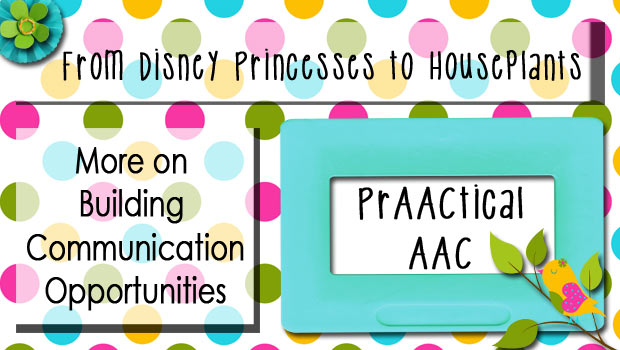
Mining everyday routines at home, in school, and in therapy sessions for communication teaching opportunities is a great way to get started in boosting the effectiveness of AAC intervention. We are inspired when we see clinicians enhance their clients’ learning by making subtle, but important changes. – I was thrilled to hear one SLP talk about how she ‘found’ more AAC practice for a teenager by offering more choices in her therapy games. Once he chose a TV character for the activity, LeVon then had to specify what action he/she would do (e.g., dance, drive, clap) and a location in which to do it (e.g., home, school, beach). Agent, action, location. Hmm…sounds like a good start for sentence-building, with a little aided language input and expansion thrown in for good measure. “Quinn drive beach.” “Yes. Quinn drove to the beach in his truck.” And it gives us great pleasure to... [Read More...]
April 28, 2012
by Carole Zangari -
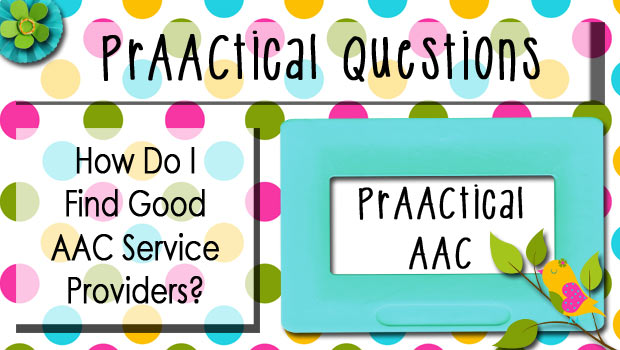
AAC is a field that involves many different disciplines, including OT, PT, SLP and education. In the best-case scenario, professionals in these disciplines work together to evaluate and provide intervention for the individual with little or no functional speech. If that option is not available, consider what discipline makes sense in your particular situation. For example, individuals with complex motor impairments may be best served initially through an OT who knows how to identify the best means of accessing AAC devices as the primary AAC service provider. For a child who is just learning to communicate, a speech-language pathologist (SLP) may be the best person to coordinate AAC services. A comprehensive AAC evaluation will always have the SLP playing a central role, which is important because of the special knowledge that they have about language and communication. How do you find an SLP with adequate skills in AAC? While there... [Read More...]
April 19, 2012
by Robin Parker -

We have many students who are getting older. It’s a time many of our families are looking at transition steps. Some families are interested in employment opportunities, others in having their now adult children live outside the home with a little or a lot of support, and others just wish there was a place for them to go after school ends. . It is difficult finding quality options. Even if there are options, it seems ‘they’ want the ‘easy’ people. (disclaimer: Now I move from the ‘we’ into the ‘me’ since Carole has been on vacation and I have been dealing with some ‘crap’ and don’t want to speak for Carole since I am hoping she is relaxed and positive). So here goes…. I could argue now that there are no ‘easy’ people. I could rant now because it has been one of those days where not a lot has... [Read More...]
April 14, 2012
by Carole Zangari -
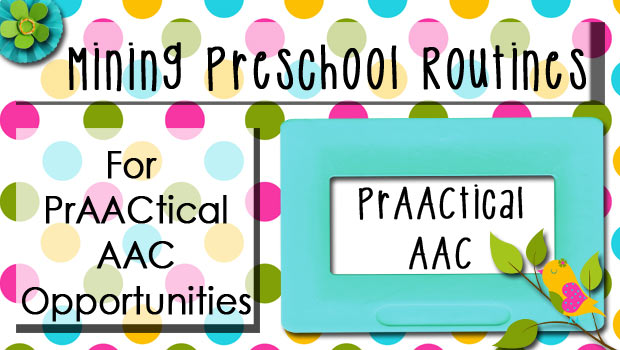
Meet Jenna, a spirited little girl with developmental delays who is learning to communicate using multiple modalities. Follow her along this morning as she goes to her preschool and gets dozens of opportunities to practice the AAC skills she is learning. 101 opportunities to practice target skills before lunch? It’s a piece of cake with this well-oiled preschool team! Jenna’s communicative functions are noted in CAPS and her communication modalities are in italics. – Let’s watch and see how Jenna is getting all that practice in as she goes about her day. – 7:55 1. Enter the building, pause at a trained adult communication partner (receptionist) for Jenna to GREET with a vocalization and wave 2. ANSWER a social question (“How are you?”) with gesture (thumbs up) 3. Say GOODBYE with a wave 4. Once in the classroom, repeat GREETINGS with teacher, aide, and a friend. 5. ASK for HELP putting... [Read More...]
April 1, 2012
by Robin Parker -
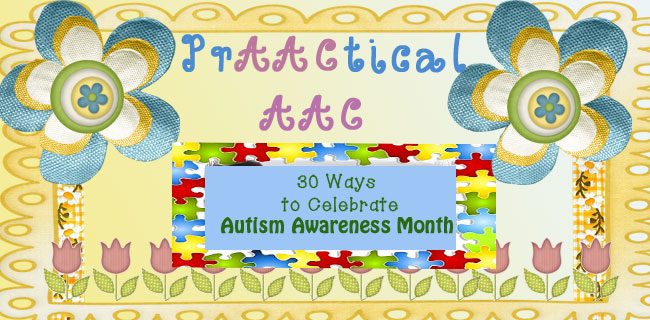
Please check out the most recent set of suggestions here. We love getting EVERYONE involved in Autism Awareness Month. We like to take a goal focused approach to our Autism Awareness Month activities by choosing projects that facilitate positive attitudes & discussions. We pass out materials, have contests, go to events, do extra talks, and try and engage EVERYONE we know and even some we do not know. We do a lot of shopping (with small amount of money, but we have to EAT and accessorize). Our families, pets, friends, and students all participate. It is a month filled with purposeful fun. Here are some of the things we will be doing. Please share any activities or projects that you know about. Bake, share, & eat some desserts. Need inspiration?.. try these Puzzle Piece Rice Crispy Treats Join the webinar Autism Explosion by Dr. Coplan will be shown... [Read More...]
March 28, 2012
by Carole Zangari -
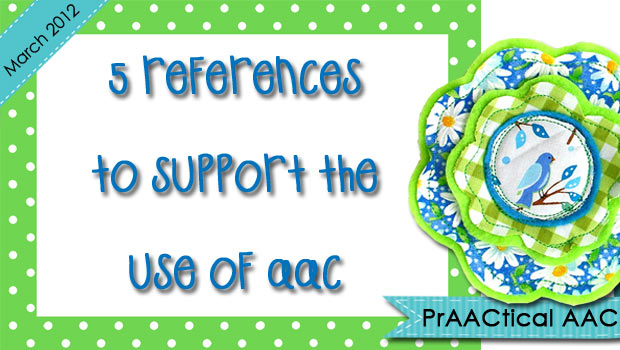
When I took my daughter to a specialist awhile back, she recommended a treatment that was a bit extreme. Her verbal explanation for the expensive and involved treatment made sense, but I still wasn’t convinced and asked it there was something we could read that explained the scientific underpinnings of the approach. She disappeared for a moment and came back with a task force report on the treatment that reviewed literature on this approach. Reading through it and seeing the studies, critiques, and responses helped us make an informed decision. – Chances are, many of you have had similar experiences. Trust in our healthcare professionals is critical, but when it comes to big decisions, we want to know the science that stands behind the options. – Making the decision to use AAC is a huge one for all of us, but families are especially burdened with its weightiness. Not only... [Read More...]
March 17, 2012
by Carole Zangari -
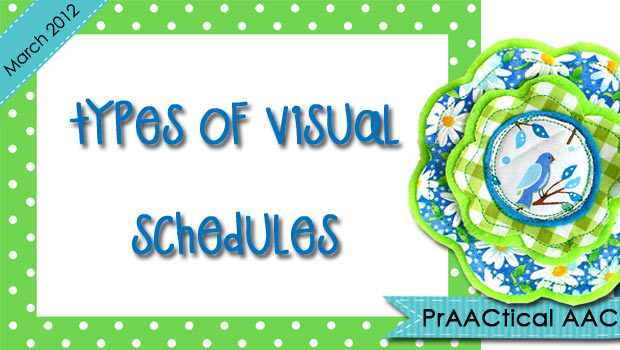
When people think about visual schedules, they tend to think about a classroom schedule with PCS for each major activity of the day. These are great and we look for them whenever we do classroom visits. In this post, we hope to inspire some of you to use other types of visual schedules as well. We haven’t quite worked out the right terms for these (and we welcome your suggestions) but, conceptually we know that there are three main levels of visual schedules. Each level conveys information about what is happening in a specific segment of time. – At the Calendar Level, the schedule represents what’s happening throughout the month and/or week. – At the Schedule Level, we’re representing the events of a particular day, a portion of a day, or a session (or class period). – At the Task Level, the schedule reflects discrete steps of an activity or... [Read More...]
February 23, 2012
by Carole Zangari -
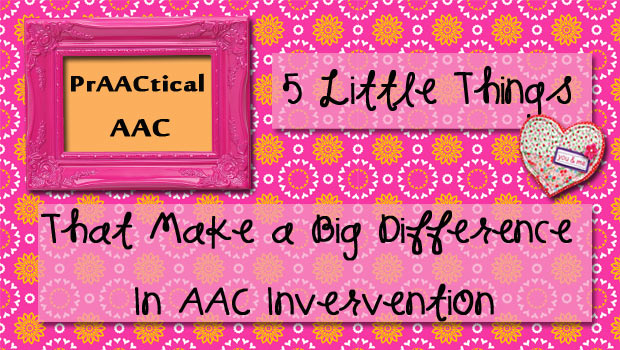
“If you think you are too small to be effective, you have never been in bed with a mosquito.” Betty Reese – Little things can make or break a good streak of AAC implementation. Here are some things that we’ve come to appreciate. They’re small in size, expense, or time demands but pay off in a big way. – 1. Wait time: There’s nothing like a 10-second expectant pause and controlled access to help someone learn to respond without more intrusive prompts. – 2. Clear plastic jars with screw-on lids (nothing beats these for limiting access so that kids are tempted to make a request) – 3. Button covers for the iPad, like these from BubCap. Amazing how a tiny piece of plastic can keep an activity or conversation from derailing. – 4. Bragging (authentically) about a colleague. “Ms. Mama, I have to tell you how awesome Polly Para was... [Read More...]
February 20, 2012
by Carole Zangari -
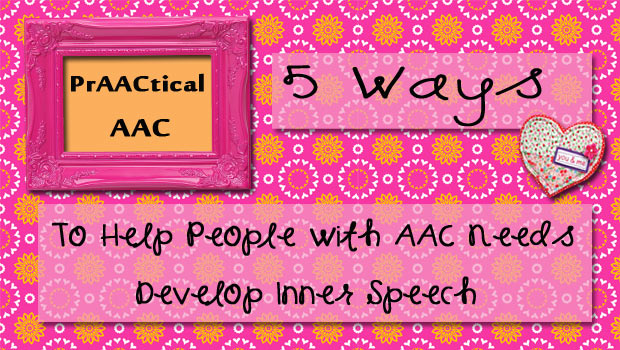
Recent research has strengthened this clinician’s belief that developing inner speech is an important strategy for many people who use AAC and are working to build their literacy skills. But how do we teach someone to develop that inner voice? Here are some ideas. – 1. Begin by using a ‘think aloud’ strategy to make your internal thought processes obvious to the person who uses AAC. Articulating your thoughts as you work through different communication and literacy learning processes gives the learner insight into what you are thinking. Once they are used to that, it is easier to introduce the concept of private/inner speech. – 2. Use explicit instruction. “Say it to yourself.” “Say it in your head.” Using natural gestures, like tapping your temple, can be helpful as well. We’ve found that this allows us to reduce the prompting over time. Fade the verbal prompt and continue the gestural one,... [Read More...]
February 15, 2012
by Carole Zangari -

We wanted to take a breather from all the busyness to reflect on the year and to offer up some words of appreciation. For us, 2011 started with our version of a retreat: a long walk in the sun, a half day of venting our frustrations and a half day of planning new projects interspersed with lunch at the beach. (There might have been a bottle of wine in there somewhere, too.) We’d both been feeling more than a bit discouraged that the quality of AAC services is still so spotty. There are some fantastic SLPs and teachers, of course, but not enough to go around. The ‘good ones’ are too busy. And the not-so-good ones were doing too much damage. It seemed to us that too many folks with significant communication challenges weren’t getting what they needed and that stressed us out to no end. Just when we had calmed down, we... [Read More...]









